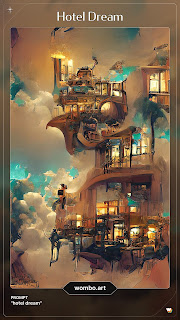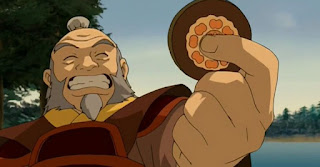My son David and I have been working on an essay about the wisdom of Uncle Iroh in Avatar: The Last Airbender. (David is a graduate student at Institut Jean Nicod in Paris.)
If you know the series, you'll know that Uncle Iroh's wisdom is hidden beneath a veneer of foolishness. He is a classic Daoist / Zhuangzian wise fool, who uses apparent stupidity and shortsightedness as a guise to achieve noble ends (in particular the end of steering his nephew Zuko onto a more humane path as future ruler of the Fire Nation). See our discussion of this in last week's post.
Since Iroh disguises his wisdom with foolishness, we thought it possible that ordinary viewers of Avatar: The Last Airbender would tend to initially regard Iroh as actually foolish, while more knowledgeable viewers would better understand the wisdom beneath the guise.
For example, in Iroh's very first appearance in the series, Zuko sees a supernatural beam of light signaling the release of the Avatar, and Iroh reacts by dismissing it as probably just celestial lights, expressing disappointment that chasing after the light would interrupt a game he was playing with tiles. It would be easy to interpret Iroh in this scene as self-absorbed, lazy, and undiscerning, and we thought that naive viewers of the series, but not knowledgeable viewers, would tend to do so. We decided to test this empirically.
Our approach fits within the general framework of "experimental aesthetics." A central aesthetic property of a work of art is how people respond psychologically to it. Those responses can be measured empirically, and in measuring them, we gain understanding of the underlying mechanisms by which we are affected by a work of art. If Iroh is perceived differently by naive versus knowledgeable viewers, then the experience of Avatar: The Last Airbender changes with repeated viewing: In the first view, people read Iroh's actions as foolish and lazy; in the second view, they appreciate the wisdom behind them. If, in contrast, Iroh is perceived as similarly wise by naive and knowledgeable viewers, then the series operates differently: It portrays Iroh in such a manner that ordinary viewers can discern from the beginning that a deeper wisdom drives his apparent foolishness.
We recruited 200 participants from Prolific, an online source of research participants commonly used in psychological research. All participants were U.S. residents aged 18-25, since we wanted an approximately equal mix of participants who knew and who did not know Avatar: The Last Airbender and we speculated that most older adults would be unfamiliar with the series. We asked participants to indicate their familiarity with Avatar: The Last Airbender on a 1-7 scale from "not at all familiar" to "very familiar." We also asked six multiple-choice knowledge questions about the series (e.g., "What was the anticipated effect of Sozin's Comet?"). In accordance with our preregistration, participants were classified as "knowledgeable" if their self-rated knowledge was four or higher and if they answered four or more of the six knowledge questions correctly. Full methodological details, raw data, and supplementary analyses are available in the online appendix.
Somewhat to our surprise, the majority of respondents -- 63% -- were knowledgeable by these criteria, and almost none were completely naive: 95% correctly answered the first (easiest) knowledge question, identifying "Aang" as the name of the main character of the series. Perhaps this was because our online recruitment language explicitly mentioned Avatar: The Last Airbender. It is thus possible that we disproportionately recruited Avatar fans or those with at least a passing knowledge of the series.
Participants viewed three short clips (about 60-90 seconds) featuring Iroh and another three short clips featuring Katara (another character in the series), in random order, with half of participants seeing all the Iroh clips first and the other half seeing all the Katara clips first. The Iroh clips were scenes from Book One in which Iroh is superficially foolish: the opening scene described above; a scene in which Iroh falls asleep in a hot spring instead of boarding Zuko's ship at the appointed time ("Winter Solstice, Part 1: The Spirit World", Episode 7, Book 1); and a scene in which Iroh "wastes time" redirecting Zuko's ship in search of gaming tile ("The Waterbending Scroll", Episode 9, Book 1). The Katara clips were similar in length; they were clips from Book One, featuring some of her relatively wiser moments.
After each scene, participants rated the character's (Iroh's or Katara's) actions on six seven-point scales: from lazy to hard-working, kind to unkind, foolish to clever, peaceful to angry, helpful to unhelpful, and most crucially for our analysis wise to unwise. After watching all three scenes for each character, participants were asked to provide a qualitative (open-ended, written) description of whether the character seemed to be wise or unwise in the three scenes.
As expected, participants rated Katara as wise in the selected scenes, with a mean response of 1.85 on our 1 (wise) to 7 (unwise) scale, with no statistically detectable difference between the naive (1.95) and knowledgeable (1.80) groups (t(192) = 1.35, p = .18). (Note that wisdom here is indicated by a relatively low number on the scale.) However, contrary to our expectations, we also found no statistically significant difference between naive and knowledgeable participants' ratings of Iroh's wisdom. Overall, participants rated him as somewhat wise in these scenes: 3.04 on the 1-7 scale (3.08 among naive participants, 3.02 among knowledgeable participants, t(192) = -0.35, p = .73).
For example, 81% of naive participants rated Iroh as wise (3 or less on the 7-point scale) in the scene described near the beginning of this post, where Iroh superficially appears to be more concerned about his tile game than about the supernatural sign of the Avatar. (Virtually the same percentage of knowledgeable participants describe him as wise in this scene: 83%.) The naive participants' written responses suggest that they tend to see Iroh's calm attitude as wise, and several naive participants appear already to discern that his superficial foolishness hides a deeper wisdom. For example, one writes:
I actually believe that though he appears to be childish and foolish that he is probably very wise. He comes off as having been through a lot and understanding how life works out. I think he hides his intelligence.
And another writes:
I am not familiar with the character, but from a brief glance he seems to be somewhat foolish and unwise. For some reason however, it seems like he might be putting on a facade and acting this way on purpose for some alterier [sic] motive, which would mean that he actually is very wise. I do not have any evidence for this though, it's just a feeling.
Although not all naive participants were this insightful into Iroh's character, the similarity in mean scores between the naive and knowledgeable participants speaks against our hypothesis that knowledgeable participants would view Iroh as overall wiser in these scenes. Nor did naive participants detectably differ from knowledgeable participants in their ratings of how lazy, kind, foolish, peaceful, or helpful Iroh or Katara are.
Although these data tended to disconfirm our hypothesis, we wondered whether it was because the "naive" participants in this study were not truly naive. Recall that 95% correctly identified the main character's name as "Aang". Many, perhaps, had already seen a few episodes or already knew about Iroh from other sources. Perhaps knowledge of Avatar: The Last Airbender is a cultural touchstone for this age group, similar to Star Wars for the older generation, so that few respondents were truly naive?
To address this possibility, we recruited 80 additional participants, ages 40-99 (mean age 51), using more general recruitment language that did not mention Avatar: The Last Airbender. In sharp contrast with our first recruitment group, few of the participants -- 7% -- were "knowledgeable" by our standards, and only 28% identified "Aang" as the main character in a multiple-choice knowledge question.
Overall, the naive participants in this older group gave Iroh a mean wisdom rating of 3.00, not significantly different from the mean of 3.08 for the naive younger participants (t(139) = -0.43, p = .67). ("Hyper-naive" participants who failed even to recognize "Aang" as the name of the main character similarly gave a mean Iroh wisdom rating of 2.89.) Qualitatively, their answers are also similar to those of the younger participants, emphasizing Iroh's calmness as his source of wisdom. As with the younger participants, some explicitly guessed that Iroh's superficial foolishness was strategic. For example:
I'm not familiar with these characters, but I think Iroh is (wisely) trying to stop his nephew from going down "the path of evil." He knows that playing the bumbling fool is the best way to give his nephew time to realize that he's on a dangerous path.
And
He comes off a as [sic] very foolish and lazy old man. But i have a feeling he is probably a lot wiser than these scenes show.
We conclude that ordinary viewers -- at least viewers in the United States that can be accessed through Prolific -- can see Iroh's foolish wisdom from the start, contrary to our initial hypothesis.
#
In Book One, Iroh behaves in ways that are superficially foolish, despite acting in obviously wise ways later in the series. There are three possible aesthetic interpretations. One is that Iroh begins the series unwise and learns wisdom along the way. Another is that Iroh is acting wise, but in a subtle way that is not visible to most viewers until later in the series, only becoming evident on a second watch. A third is that, even from the beginning, it is evident to most intended viewers that Iroh's seeming foolishness conceals a deeper wisdom. On a combination of interpretive and empirical grounds, explored in this blog post and last week's, the third interpretation is the best supported.
To understand Iroh's wisdom, it is useful to look to the ancient Daoist Zhuangzi, specifically Zhuangzi's advice for dealing with incompetent rulers by following peacefully along with them, unthreateningly modeling disregard for fame and accomplishment while not being too useful for their ends. Since Zhuangzi provides no concrete examples of how this is supposed to work, we can look to Iroh's character as an illustration of the Zhuangzian approach to political advising. In this way, Avatar: The Last Airbender -- and the beloved uncle Iroh -- can help us better understand Zhuangzi in particular and the Daoist tradition in general.
-----------------------------------
Full draft essay available here. Comments and suggestions welcome! It's under revise and resubmit, and we hope to submit the revised version by the end of the month.
[image source]



